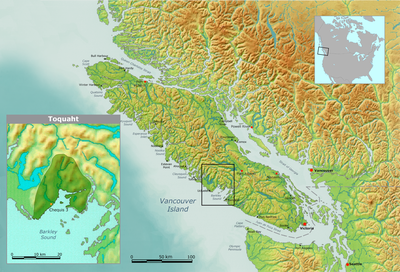Toquaht
The Toquaht are North American Indians and live on Vancouver Island , off the west coast of Canada . They speak Wakash and belong to the Nuu-chah-nulth . They are mainly represented vis-à-vis the Canadian government by the Nuu-chah-nulth Tribal Council .
Toquaht means something like "people of the narrow (or narrow) channel".
In April 2010 there were 137 (May 2009: 141) recognized members, of which only 8 lived in the reservation , 7 in other reservations, one woman on crown land, the remaining 121 outside.
Reservations
The Toquaht are spread over 7 reserves with a total of 196 hectares. The main reserve is on the north side of the Barkley Sound , where 34 tribesmen lived in 2001. The remaining 67 lived outside the reserve. There are now only 8 Toquaht left on the reservation.
Political situation
As part of the treaty negotiations with Canada and the Province of British Columbia (BC Treaty Process), the Toquaht First Nation agreed to the constitution on August 22, 2007 under the leadership of traditional chief Bert Mack . Like the other four First Nations of the Maa nulth group , this gave them considerably more extensive areas than the reserve, but renounced the traditional tribal area. At the same time, the land is being privatized, so it is neither protected against sale nor expropriation. Therefore, the aim of the BC Treaty Process is increasingly controversial. Still, 91% of the Toquaht agreed. Similarly, the Ka: 'yu:' k't'h '/ Che: k: tles7et'h' First Nations have on August 4th, the Uchucklesaht Tribe on June 16th, the Ucluelet First Nation on June 15th and the Huu -ay-aht First Nations voted on May 28, 2007, who belong to the same negotiating group. The agreement has now been ratified by the province of British Columbia. In June 2009 the federal government ratified the treaty.
history
The original residential area of the Toquaht was around the village of T'ukw'aa - the Toquaht are thus the "people of T'ukw'aa". The place was inhabited from at least about 800 until the early 20th century. In contrast, the village of Ch'uumat'a was probably abandoned as early as the 19th century . Here the finds reach back to around 2000 BC. BC back. During an archaeological excavation campaign (1991–1996) around 1,500 artefacts were documented, as well as 50 sites, including villages, fish traps, defensive structures and a rock painting .
In the mid-19th century, the tribal area consisted of the west bank of Barkley Sound , Toquart and Mayne Bay, and Pipestem Inlet.
In 1881 and 1891 only 32 people were considered toquaht. They were assigned their current reservation around the villages of Macoah and Chequis in the 1880s. In 1881 the residents were divided into three families, one of which consisted of 18, one 11 and one 3 people. The latter family was childless. The oldest member of the tribe was 56 years old, the chief was Cle a wit voa (52), who also came from the largest family. Only two names were recognizable of European origin, the remaining 30 people had traditional names.
See also
Web links
Remarks
- ↑ According to the information from the Department of Indian Affairs and Northern Development , First Nation Profiles: Toquaht ( Memento of the original from June 28, 2009 in the Internet Archive ) Info: The archive link was inserted automatically and has not yet been checked. Please check the original and archive link according to the instructions and then remove this notice.
- ↑ The official government announcement can be found here: Toquaht Nation apporves Constitution, August 22, 2007 ( Memento of the original of June 26, 2009 in the Internet Archive ) Info: The archive link was inserted automatically and has not yet been checked. Please check the original and archive link according to the instructions and then remove this notice. .
- ↑ Federal government approves treaty with Maa-nulth First Nations on Vancouver Island , in: Times-Colonist, June 17, 2009 ( Memento of June 26, 2009 in the Internet Archive )
- ↑ The census results can be found on viHistory Census Search .
